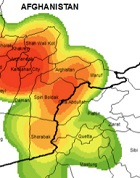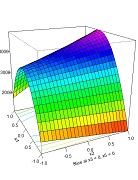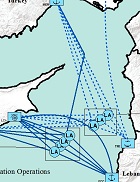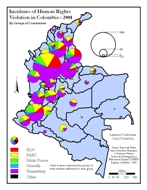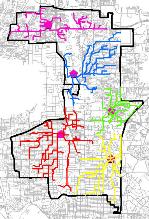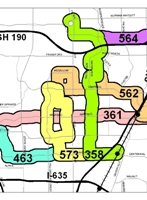The Center for Location Science
Optimal Facility Location. Spatial Analysis. Geographic Information Systems and Science.
George Mason University
Research ProjectsThe Center for Location Science conducts scholarly research about challenging problems that are fundamentally spatial in nature. The Center pursues grant and contract support from federal, state, and local agencies as well as non-profit corporations and for-profit enterprises. Summaries of some of the Center's active projects appear below.
Operational-Level Optimization of Autonomous Logistics EnterprisesDescription: The revolution in autonomous logistics is an anticipated transformation in high-efficiency, high-speed, and highly integrated transportation and supply-chain management systems that will rely on the deployment of unmanned and self-driving air, ground, and sea platforms. It will also rely on algorithms that enhance agent autonomy and on computational approaches to combinatorially complex location and allocation decisions. This project explores a series of interrelated logistical problems in the unmanned/autonomous context in order to anticipate and develop mitigation strategies for the challenges they represent. Awarded: 2016 Duration: 5/1/2016 – 4/30/2018 Co-PI: Alec D. Barker, Ph.D. Funded amount: $737,609 Funding agency: U.S. Navy Office of Naval Research
Understanding Network Socio-Geographic Dynamics:Using smartphones to locate, track, and study goal-directed team behaviorsDescription: This project examines the spatial characteristics of team activities, especially the movements and communications of human groups trying to accomplish specific organizational tasks. It uses computer simulation, interactive computer games, customized smartphones, and teams of human subjects in games like hide-and-seek. The project is collecting information and building concepts to help us understand why, how, and when individuals, teams, and systems of teams make choices about their locations. Phase IAwarded: 2013 Duration: 11/1/13 – 09/29/15 Co-PI: Richard M. Medina, Ph.D. Co-Investigator: Alec D. Barker, Ph.D. Funded amount: $337,566 Funding agency: U.S. Army Research Institute for the Behavioral and Social Sciences Phase IIAwarded: 2015 Duration: 09/29/15 - 11/29/2016 Co-PI: Alec D. Barker, Ph.D. Graduate Research Assistants: Rebecca M. Rice, John Solly Funded amount: $189,744 (Total $527,311) Funding agency: U.S. Army Research Institute for the Behavioral and Social Sciences
Related publications and presentations:
FEMA/SAFER CFCA Recruitment and Retention Phase IIDescription: Kevin M. Curtin, PhD acts as the University Partner for Phase II of the Volunteer Workforce Solutions (VWS) Project, under the auspices of the Connecticut Fire Chiefs Association (CFCA) and their partner the International Association of Fire Chiefs (IAFC). Dr. Curtin meets the evaluation and analytical needs of CFCA and IAFC in the hope of improving volunteer firefighter recruitment and retention. Awarded: 2014 Duration: 11/1/14 - 7/1/16 Graduate Research Assistant: Rebecca Hill Funded amount: $97,525 Funding agency: Federal Emergency Management Agency and the International Association of Fire Chiefs Related publications and presentations:
FSTAR - Firefighter Safety Through Advanced ResearchDescription: Kevin M. Curtin, PhD acts as the University Partner for FSTAR project Awarded: 2015 Duration: 12/9/15 - 4/22/16 Graduate Research Assistants: Jasmin Khangura and Rebecca Hill Undergraduate Research Assistant: Kelsey Ciarrocca Funded amount: $37,809 Funding agency: Federal Emergency Management Agency and the International Association of Fire Chiefs Related publications and presentations:
|

